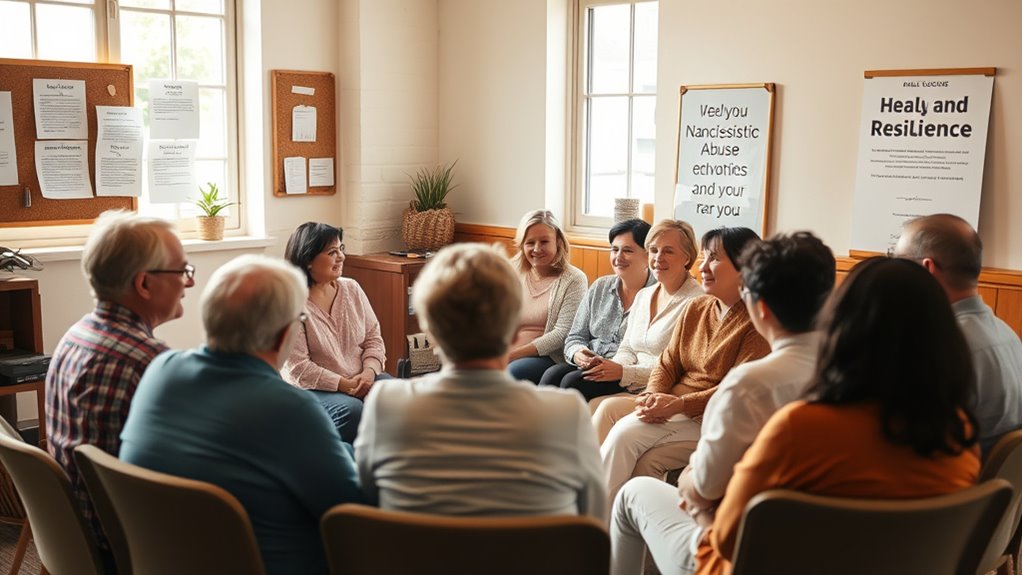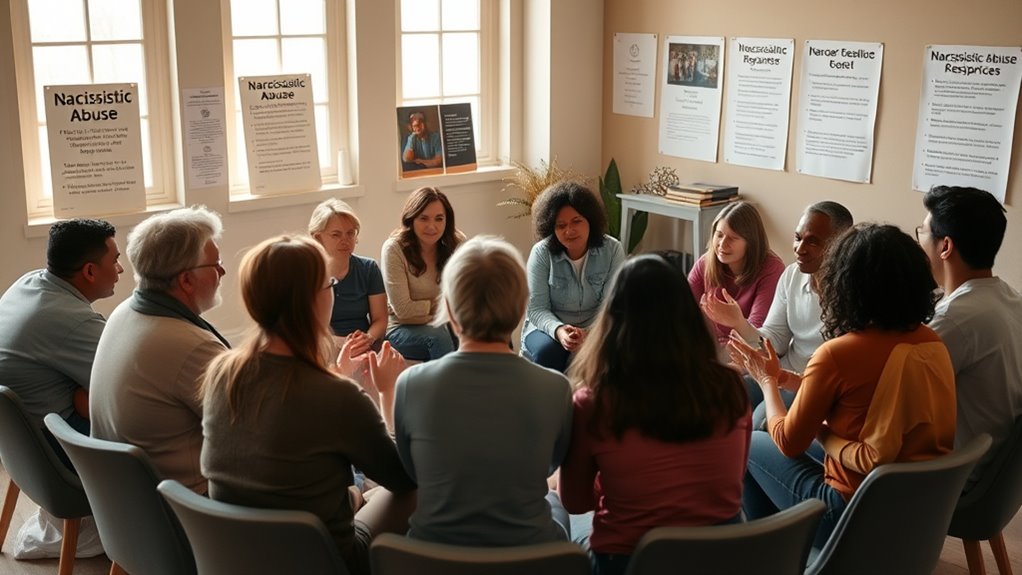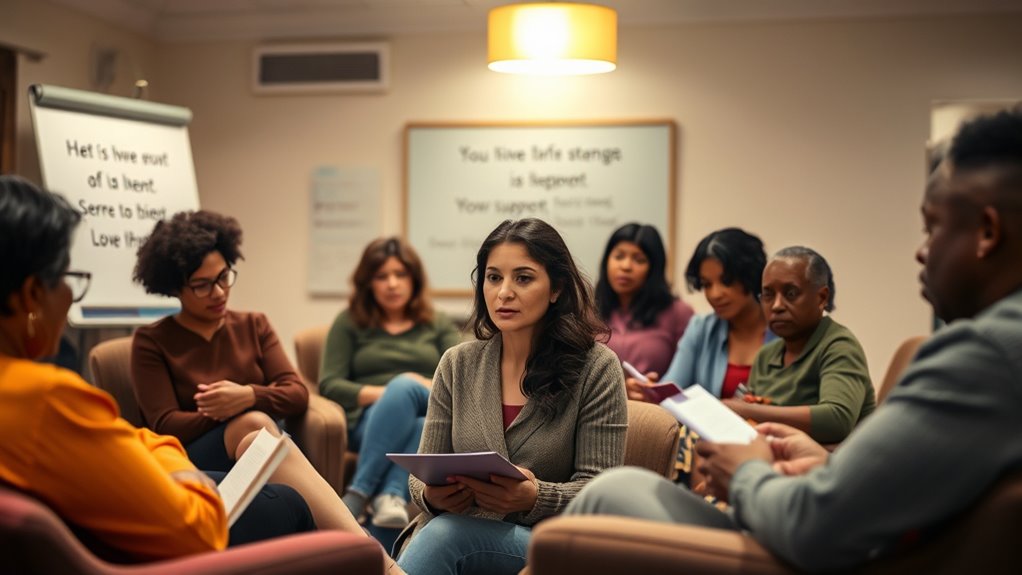To find support for narcissistic abuse, explore local support groups, therapy centers, and specialized programs that focus on healing from emotional trauma. Online communities offer anonymity and constant peer connection, making it easier to share and learn from others’ experiences. Expert-led resources, like certified trauma programs, provide structured recovery tools. Choosing the right support depends on safety, confidentiality, facilitator credentials, and your specific needs. Continue exploring to discover more ways to build your support network.
Key Takeaways
- Explore local, community-based support groups and specialized programs focused on narcissistic abuse recovery, often recommended by mental health professionals.
- Use online platforms and apps like MyNARA for confidential, peer-led support and resources accessible anytime.
- Ensure privacy through pseudonyms, secure sign-up processes, and platform security features like end-to-end encryption.
- Seek expert-led resources with trauma-specific certifications and evidence-based techniques such as CBT, EMDR, and body-based practices.
- Advocate for support groups with qualified facilitators, tailored to your needs, and consider participation in awareness campaigns like #IfMyWoundsWereVisible.
Exploring Local and Community-Based Support Options

Exploring local and community-based support options is a crucial step in healing from narcissistic abuse. Your mental health provider can offer personalized recommendations for support groups tailored to your specific experiences, whether emotional or psychological. Therapists often have knowledge of local resources and trusted networks, ensuring safe and effective referrals. They can connect you with groups led by trained professionals or those focused on particular abuse types. Domestic violence centers also provide specialized groups designed to support survivors through emotional and practical challenges. Additionally, local directories maintained by libraries, clinics, or community centers list available support groups, making it easier to find accessible, low-cost options. These community-based resources are essential for creating a supportive environment and fostering community connection on your healing journey. Recognizing the importance of cultural significance in support networks can enhance your comfort and engagement in recovery efforts. Furthermore, understanding the resources and tools available in your area can empower you to access comprehensive support tailored to your needs. Incorporating peer support networks can also provide additional understanding and shared experiences that foster resilience and hope during recovery.
The Benefits of Online Support Communities

Online support communities offer the privacy and anonymity you need to share your experiences without fear of judgment. They provide ongoing peer support, so you can connect with others who understand your journey at any time. This combination creates a safe space that fosters healing and empowerment from anywhere you are. Support groups can also help combat feelings of loneliness and isolation, which are common in survivors of narcissistic abuse. Additionally, access to specialized resources within these communities can further aid in your recovery process. Engaging with these support networks can also reinforce your resilience by connecting you with people who share your passion for creating a supportive environment. Maintaining your privacy preferences ensures that your participation remains secure and tailored to your comfort level. Being aware of affiliate disclosure policies can help you understand how your participation might support the community financially without additional cost to you.
Anonymity and Privacy
Anonymity and privacy are essential benefits of online support communities for victims of narcissistic abuse, allowing you to share your experiences without fear of exposure or judgment. These communities implement several measures to protect your identity and conversations:
- Pseudonyms and first names are used instead of full identities to maintain anonymity.
- Secure sign-up processes with email verification prevent unauthorized access.
- Platform security features like end-to-end encryption safeguard your communications.
- Adjustable privacy settings give you control over what personal information is shared.
Additionally, strict confidentiality policies and NDAs ensure that your shared stories stay private. This environment encourages open, honest conversations while minimizing vulnerability, helping you focus on healing without worry about exposure. Privacy protection measures are continually updated to adapt to new security challenges, ensuring your information remains secure at all times.
Continuous Peer Support
Continuous peer support fortifies your healing process by providing consistent connection with others who understand your experiences. Online support communities offer expert-led sessions, fostering healing through structured activities, boundary-setting, and trauma processing. Shared experience validation reduces isolation and normalizes symptoms, while collective problem-solving rebuilds confidence. Safe venting spaces, moderated to prevent triggers, ensure emotional safety. Accessibility through global, mobile, and flexible platforms allows you to participate regularly, whether via live sessions or forums. Multiple engagement options keep you connected, with crisis support like #741741 providing immediate help when needed. This ongoing peer support helps you stay motivated, learn new skills, and rebuild resilience alongside others who truly understand your journey. Recognizing the importance of nutrients in recovery, these communities often share information on maintaining a healthy diet to support mental well-being. Additionally, incorporating predictive analytics can help tailor support resources to individual needs, enhancing the effectiveness of recovery efforts. Engaging in community discussions can also help identify effective coping strategies that resonate with your personal experiences. Furthermore, staying informed about Volkswagen Tuning options can empower car enthusiasts to optimize their vehicle performance safely and effectively, paralleling the importance of informed support in emotional recovery.
Expert-Led Resources for Narcissistic Abuse Recovery

You can access expert-led resources that offer structured, proven approaches to healing from narcissistic abuse. These programs are facilitated by professionals with specialized credentials, ensuring you get quality guidance tailored to your needs. By choosing reputable groups, you gain targeted support designed to rebuild your confidence and boundaries effectively. Science-based techniques like NARP™ utilize theta brain wave states to facilitate deep trauma release, providing a faster and more effective healing process. Recognizing the signs of narcissistic behavior can help you identify unhealthy dynamics early and seek appropriate support. Understanding the types of support groups available can also enhance your recovery journey. Additionally, exploring merchant services can be beneficial if you are considering online platforms for therapy or support resources. Developing an awareness of emotional triggers can further empower you to manage interactions and protect your mental health during recovery.
Professional Facilitator Credentials
Professional facilitator credentials are essential for ensuring effective and credible support for those recovering from narcissistic abuse. When evaluating resources, look for programs with qualified professionals who meet rigorous standards. Here’s what to consider:
- Trauma Certification: Facilitators should have trauma-specific credentials before tackling narcissistic abuse recovery. Trauma Certification ensures they possess specialized knowledge in handling complex trauma cases. Additionally, understanding the nuances of emotional trauma is crucial for effective treatment. Developing an awareness of creative practice can also enhance therapeutic approaches for survivors. Incorporating evidence-based protocols into treatment plans helps ensure the support provided is scientifically grounded and effective.
- Advanced Training: Certificates indicate foundational knowledge, but certifications involve thorough assessments and longer training.
- Core Competency Workshops: Look for intensive workshops with evidence-based protocols, like 7.5-hour sessions, for survivor treatment.
- Licensure and Continuing Education: Professionals should hold valid licenses and complete CEU hours, ensuring they stay current with best practices.
Choosing facilitators with these credentials guarantees you’re working with experienced, qualified experts committed to your healing.
Specialized Group Offerings
Specialized group offerings for narcissistic abuse recovery provide targeted, expert-led resources that support healing beyond general support networks. These programs focus on specific needs, such as rebuilding trust, managing trauma, and strengthening boundaries. Virtual support groups connect you globally through platforms like Circles and Bay Area CBT Center, offering confidential, accessible sessions led by licensed professionals. Structured programs, like 8-week courses, guide you through practical steps toward resilience and empowerment. Audio/text-based groups provide flexible options, minimizing stress and encouraging anonymity. Additionally, specialized modalities like CBT, EMDR, and family therapy address trauma’s unique effects. These offerings create a safe, focused environment where you can heal holistically and regain control over your recovery journey. Incorporating Kia Tuning techniques can also help in restoring confidence and personal empowerment during recovery. Exploring certifications and endorsements from beauty experts can further enhance trust in the support resources you choose. Utilizing evidence-based approaches ensures that your healing process is grounded in proven methods tailored to address complex trauma. Recognizing the importance of support network diversity can help ensure a well-rounded recovery experience.
Connecting Through Advocacy and Awareness Initiatives

How can advocacy and awareness initiatives foster connection and support among survivors of narcissistic abuse? These efforts create a sense of community, validation, and shared purpose. They help you recognize you’re not alone and empower you to seek healing. Here’s how they do it:
- Raise Visibility: Campaigns like World Narcissistic Abuse Awareness Day highlight the widespread impact, helping survivors feel seen and understood. However, tracking the true prevalence remains difficult due to underreporting and diagnostic challenges. Increasing public awareness can also reduce stigma and encourage more victims to seek help. Additionally, understanding personality traits and communication styles can further enhance empathy and support within these communities.
- Build Community: Hashtags like #IfMyWoundsWereVisible connect people online, fostering solidarity and mutual support.
- Educate and Normalize: High-profile advocates and social media content help you identify patterns like gaslighting, reducing shame.
- Legitimize your experience: Media coverage and clinical recognition validate your trauma, encouraging engagement with advocacy efforts and support networks. Understanding personality traits and communication styles can further enhance empathy and support within these communities.
Tools and Platforms for Finding the Right Support Group

Finding the right support group involves exploring various tools and platforms designed to connect survivors effectively. Virtual support platforms offer structured online sessions, usually weekly, with agenda-driven discussions that focus on sharing experiences, exchanging resources, and problem-solving. You can sign up flexibly through platforms like Eventbrite, creating a free account to join sessions that aim to build supportive networks and teach coping tools. Moderated professional groups, led by licensed clinicians, provide expert advice and evidence-based strategies like CBT, often blending group support with individual therapy. Survivor-led recovery apps like MyNARA offer anonymous, secure communication, connecting you with a global community. These tools guarantee safety, confidentiality, and active participation, helping you find the right support environment tailored to your needs. Online peer support groups have become increasingly popular for their accessibility and sense of community, making it easier for survivors to find empathetic understanding from others who truly relate to their experiences.
Key Considerations When Choosing a Support Group

Choosing the right support group involves evaluating several key factors to guarantee it meets your needs and keeps you safe. First, verify confidentiality and safety protocols, such as administrator-controlled privacy policies, member-secrecy agreements, trained facilitators, secure platforms, and post-group privacy rules. Second, consider the group structure and format: decide between cycle or open enrollment, live or recorded sessions, small or large groups, and integrated approaches. Third, check facilitator qualifications: confirm credentials, experience, crisis training, supervision, and appropriate member-to-leader ratios. Fourth, evaluate the recovery focus, including boundary exercises, confidence-building tools, body-based practices, and peer sharing. Finally, review accessibility and costs: compare fee structures, platform compatibility, geographic flexibility, session frequency, and available financial aid options. Additionally, understanding cost variances can help you assess the financial aspects of support options more effectively.
Frequently Asked Questions
How Can I Verify the Credibility of a Support Group?
To verify a support group’s credibility, you should check if it has trained moderators who guarantee respectful interactions and safety. Look for clear privacy policies, confidentiality agreements, and encrypted platforms to protect your info. Confirm if the group partners with mental health professionals and uses evidence-based methods. You can also read reviews or ask for recommendations from trusted sources to ensure the group promotes genuine healing and support.
Are Online Support Groups Suitable for Severe Narcissistic Abuse Cases?
Like trusting a lighthouse in a storm, online support groups can guide you through severe narcissistic abuse. They’re accessible, private, and flexible, ideal if you’re overwhelmed or isolated. With trained moderators and structured healing techniques, these groups foster validation and teach boundaries. However, be cautious of potential toxicity and seek professional therapy if needed. When carefully chosen, online support offers a crucial lifeline on your recovery journey.
What Are the Costs Associated With Joining Support Groups?
The costs of joining support groups vary depending on your location and the program. You might pay per session, typically $20 to $75, or face one-time fees like $25 registration or $250 for initial evaluations. Some groups accept insurance, reducing out-of-pocket expenses, while others offer sliding scales or discounts for existing clients. Be sure to check specific programs for exact costs, payment options, and available financial aid.
How Do I Find Culturally Sensitive or Language-Specific Groups?
Imagine discovering a safe haven that truly understands your unique background. To find culturally sensitive or language-specific groups, start with online directories like BetterHelp or trauma-focused platforms, filtering by language or culture. Reach out to local community centers, faith-based organizations, or ethnic hubs—they often host tailored support groups. Social media can also connect you to regional or language-specific networks. Your cultural identity can be a bridge to healing and understanding.
Can Support Groups Provide Legal or Financial Advice?
Support groups can’t give you formal legal or financial advice since they lack certifications and can’t handle complex cases. Instead, they offer emotional support, help you recognize abuse patterns, and share coping strategies. If you need specific guidance, you should consult licensed attorneys or financial professionals. Support groups can connect you to these resources or provide referrals, but for detailed legal or financial help, professional expertise is essential.
Conclusion
Finding the right support can truly change your healing journey, but the path isn’t always clear. Are you ready to discover the resources that could make all the difference? Whether you choose local groups, online communities, or expert-led programs, each step brings you closer to understanding and recovery. The next move could be the one that *unlocks* the support you’ve been searching for—are you prepared to take it?










